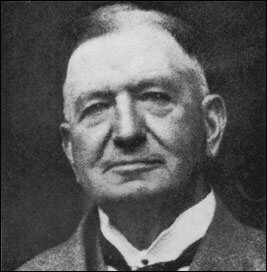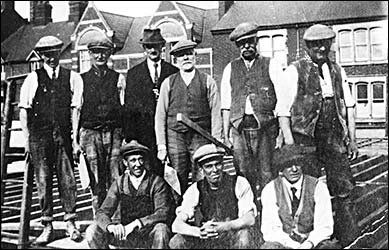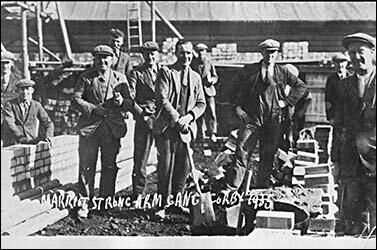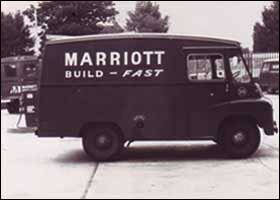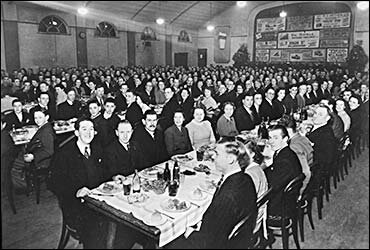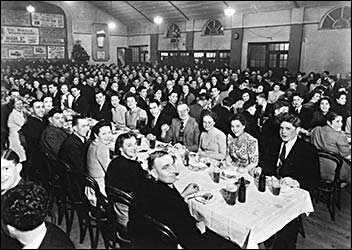|
|
||||||||||||
|
From an interview with Rae Drage on 23.3.2009. Transcribed by Jacky Lawrence |
||||||||||||
|
Derek Houghton - working at Marriott's
|
||||||||||||
|
||||||||||||
|
I got the job through my father seeing Mr. Robert Marriott, who was a great gentleman, a fine man. He told my father to take me to see him on the Tuesday, I think it was, and he said. ‘Yes, I’d like you to start, start, tomorrow, go down to the yard, meet Mr. Frank Wright, who is the foreman plumber.’ And probably one of the best plumbers there ever was and the best men there ever was, and then he said. ‘Then next week I want you to go up to Chellingham.’ They were doing some work on the old castle up agin Berwick on Tweed and of course they loved this. So I went down and reported in to Mr. Wright and said. ‘Right, but I’m going up to Chellingham next week.’ He said. ‘Who said?’ I said. ‘Mr. Marriott.’ He said. ‘I’m your foreman not Mr. Marriott, you’re stopping here.’ And there I stopped.
We did quite a bit of jobbing work around town at that time and it was my good fortune to work with people like Bert Massam and Shinner Frear and thought that was good grounding. We did quite a fair amount of work in connection with Professor Richardson who I think at one time was president of the Royal Academy. Most of this had been done just before the war, before I got there. During the war we worked on a lot of small Army camps, did a lot of maintenance work there. One thing I remember in particular, when the first Americans came to Rushden, they come up to Rushden Hall and we did some repairs and got that habitable for them to use. We did also in those days what we term “a term contract” with the Army which meant we went and did maintenance work on all the Army sites around the area. Surprising how many there were, searchlight sites and ack-ack gun sites, right from Corby out to Kingscliffe and back down round, all the Northampton area. The other men probably got called up and for quite a period the only plumbers almost in Rushden, I think, were Frank Wright and myself. We would go out all day, working a lot of work around the Sharnbrook and North Bedfordshire area, come back and find notes screwed into the vice in our workshop and we’d go trotting off to do work there until, oh, might be 10, 11, 12 o’clock at night. It was interesting and we made good fun of it.
Just after the war, remember working quite extensively on Wimpole church in Cambridgeshire and a little bit of work, I wasn’t involved all that much, but a little bit on Hatfield House and quite a few churches around the area. I remember making special copper heads and lead drainpipes for them and it was all very interesting work. And schools, one I remember again in particular was the Henry Gotch school at Kettering, I remember that vividly. And what else, well various, it was a long while ago now wasn’t it? But lots of sites I can say right from, probably, about Towcester right out to Peterborough and beyond and then north to Leicester and well south to north Bedfordshire. Later in years I remember I went to places like Milton Keynes and Hemel Hempstead, but not in this context probably. I got called up just for 18 months and the first job I came back to was the Turney’s, the chicken farmers at Quinton Green outside Northampton. Mrs Turney was one of Robert Marriott’s daughters and we did this work there. Every Friday, after lunch, we left our lunch bags in a specific spot and one of the lads used to have to take these bags and put some straw in the bottom. When we came home at night we picked our bags up and there were 9 eggs in them. Just 9, never half a score, but 9 eggs there were. I remember that very well, as did my mother, because I’m talking of 1945/6.
Now I remember, I say, with bricklayers when the labourers nodded, as we called the board on the head, bricks on and up the ladder that way, which, yes, it was interesting I suppose. There’s some marvellous characters there, Bunny Brown from Podington, Mackie Carter from Bozeat and a chappie named Rip Underwood from Wellingborough who was supposedly the practical joker to end all practical jokers. A family from Wellingborough who were bricklayers, that were stalwarts for a bit, the Kempshire family. I remember George Osborne, who came to us during the war, who worked actually on the fairgrounds and used to make themselves that fairground rock. He’d still got his permit to get sugar, he used to make it and bring it and sell us that. Once we went, just after the war because it was before we were married, we had a train and they took us all to London and gave us a meal. Lambeth Town Hall I think, then we were left to our own devices. But I don’t remember going anywhere else on a, no, we didn’t. I can only remember one sort of social evening, dinner dance, whatever you wanted to call it, up the Windmill. But I think in later years they had several social functions and that, but at that time we just had this one, I think, up at the Windmill, be about 1949, something like that.
Then I suppose things altered a bit, when we went into doing bonus work. Particularly on, we were doing a lot of council houses, that formed a bit of a change, that weren’t too drastic. We used to do a lot of work at Podington, on the estate there. I remember going there mending burst pipes in that very bad ‘46/’47 winter. We did burst pipes for Rushden Council too, hundreds of them, because they were all old lead pipes in the outside toilets. All round Irchester Road, Trafford Road, Tennyson Road, hundreds of them. The first week, I started on the Tuesday, we used to get paid on the Friday then, for up to the Friday evening. As an apprentice I had 7s 6d but I think up to, I think when I got married, I think I got about £7 something, that was ’48. We had, I think, somewhere about ’47, we had one of the biggest rises that anybody had ever had. I think the basic rate was about 1s 11d an hour then and I think it went up to 2s 5d an hour and we had a penny cost of living rise, as we used to have then. So it made it half a crown an hour, so it weren’t all that much, was it. But we got through on it yes, yes, I got married on it so it couldn’t have been too bad. We used to go to the Tech night school at times but with the hours we were working it wasn’t turned out possible. Generally I learned off people like Bert Massam, Shinner Frear and Frank Wright who was, I can’t speak too highly of him, he was an Irthlingborough bloke actually, he lives in Quorn Road, ginger haired fellow. Great to me he was. I generally cycled to work. Occasionally, I mean if we were going farther afield, we used to use a blooming old car with a trailer on the back. Of course there were one or two lorries about that would take stuff for us. But, for instance, we did quite a fair bit of work which was on the Bromborough estate, which was at Podington. And you know used to bike to Podington from here, call in at Rushden probably but bike most places. If we were going out to a job say, there might have been half a dozen or more people, varying trades, then we might have a lorry with a “living tilt” as we called it on the back. An old canvas shelter like, we took off when you got there and the lorry could go off and you just got in and came back, you were very comfortable. Barnwell, I worked down at Barnwell on the castle there, a little bit, not much, but just a bit. I finished in '90 as a general foreman, site foreman, yes.
|
||||||||||||
|
click here to read another employee's memories
click here to read the history of Marriott's |
||||||||||||
|
|
||||||||||||
|
|
||||||||||||
